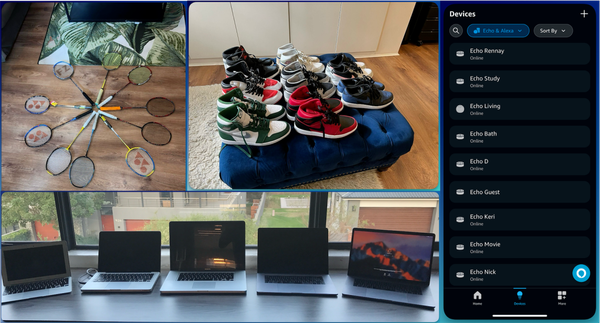7 Critical Insights Every Tech Professional Needs to Avoid Obsolescence

The mental image I have is that many people in the technology industry are on the shore, enjoying a beautiful day at the beach. To the delight of the crowd, the waves are coming in more frequently, each a little higher and more exciting than the one before. AWS launched in 2006, machine learning become popular in the 2010s, Docker was released in 2013 which enabled Containerisation. I believe that a tsunami, in the form of AI, is rapidly approaching, heralded by the recent GenAI releases.
The intention of this article is to replace the sense of complacency of the crowd with one of urgency. Our attitude needs to change - if we are going to survive. This piece has insights for those just entering, seasoned veterans in complex tech roles, as well as those on the fringe. It is a deliberately hard-hitting piece to alert the crowd of the pending danger. I have more than two decades of deep experience in tech, and have worked across many industries. I believe all industries will be significantly impacted in the next 2-3 years.
Insight #1: Tree huggers don’t see the forest
I clearly recall not being able to colour between the lines as a kid. Back then, it was a negative. Now, I consider it a positive.
My theory, and annoyance, is that many technical folk are becoming experts at staying within the lines. Although this position allows them to maintain plausible deniability, they lose the brass-ring opportunity of seeing the bigger picture. I believe that this allows you to understand how your part fits into the overall solution, relative to others. It also affords you the opportunity to make your piece better. Zooming out helps to provide a different perspective and you might find other areas of the business or even industries that you could work in.
Many might argue that staying in your lane is safe and predictable. My counter is that - sometimes those lanes end, with little warning. Ask those in the content creation and media industry, that was massively disrupted by Generative AI (GenAI).
Insight #2: AI is going to eat your lunch
In the same way, that video killed the radio star and the internet killed the video star, AI is coming after your job.
I am deliberately being an alarmist to scare you! Tools like Amazon Q and GitHub Copilot are touted to improve developer efficiency. If you have not seen a demo of these tools, a developer essentially writes a prompt in the editor for a specific function and the code appears. It is almost magical to watch. Previously, I started a search on Google, found the right documentation, learnt how something worked, and wrote the function. If I was lucky, I could find a snippet on StackOverflow. Given the rapid advancement of GenAI and how these tools and assistants are popping up virtually everywhere, how long do you think it will be before (i) someone with far less experience than you, can do what you can and/or (ii) the “assistant” becomes the “developer” and writes everything.
You need to be aware that we are in a techology sector that is rapidly evolving. Ask yourself - what is your differentiating factor or skill or capability that will allow you to stay relevant, and more importantly, employed?
Insight #3: If you're smart, you can get AI to make your lunch
To win the game, you have to set the rules!
Tools like ChatGPT are plugging into the Internet (or a snapshot). There is absolutely no way you can compete with that. Our superpower (as humans), or differentiator, is our experience. From hours spent on support calls in the middle of the night in 2004, I learned that solutions, although architecturally beautiful, need hooks or mechanisms to be more supportable, that load testing in isolation means nothing compared to a peak period of a mobile network when thousands of subscribers are doing thousands of unique things. When using GenAI tooling, it is absolutely critical that you do not become a slave to the tool by letting it think for you.
You do this by first thinking about what you want, then seeding it with an idea, then refining that idea. It is important that your experience, skill, thoughts, even bias is part of the solution. Let AI work for you.
Insight #4: RTFM!
To many outside the IT industry, this may seem incredibly rude. To those of us inside, these are words to live by.
To become really proficient in a domain, you have to dive deep. As an example, anyone can watch a re:invent YouTube video about Amazon Step Functions and talk about it. It is only when you’re building a solution and grappling with the challenge of maintaining state that you truly begin to understand it. Back in high school, my Afrikaans book review consisted of the description from the back cover. Although I thought I got away with it, my teacher probably saw it in an instant - and the poor grade I received confirmed it.
Once you know how something works, this will help you to identify what problem it could solve and where to use it.
Insight #5: Roll up your sleeves
Over my career, I have worked in various roles. As a developer, technical lead, support engineer, architect, even as an evangelist.
I consider it my superpower that I am still able to dive into any of these roles. Ironically, there are many in the IT industry who intentionally stay out of the detail. The massive middle-management cuts at Twitter when Elon Musk took control is a great exhibit of why it is necessary to keep a foot firmly in both worlds. From first-hand experience and from both sides of the table, most technical teams don’t want you to get into the trenches. What they do want is for their leaders to understand what they’re up against so you can send reinforcements or at least empathise with sincerity!
If you find that you're increasingly starting to openly admit that you’re not technical and there are smarter people who know how to fix the problem, it is a clear warning sign. If you’re upset with this last statement, please note that the title of this piece clearly highlights Tech Professionals.
Insight #6: Ask questions
When delivering a technical presentation, it is super disappointing that, on most occasions, there are little to no questions.
From my recent articles, I would like to think that I can create and deliver good technical presentations. Although I’m a good storyteller, I’m no Enid Blyton and I’m certain that there are some members in the audience who might not have understood or agreed with my approach. You might find this interesting - but asking a question is beneficial to both parties.
The questioner gets more insight/clarity. The presenter gets a new perspective, has to evaluate how their solution solves a particular problem, and finds someone who wants to learn.
Insight #7: Retros are better than autopsies
Early in my career, I developed the habit of sending out long, elaborate CYA emails. What a waste of time!
With the experience of many projects from enterprise to startup, I can assure you that, when something does not work, the only thing senior executives care about is fixing the problem. If the project fails for some reason, you are still part of the team. Which means you also failed. And you risk distancing yourself from the team by taking a “I told you so” attitude. My good friend, ASIF HAMZA , provides a powerful visual. If you believe the ship is going to hit an iceberg and you have little control to change the ship’s direction, there is still something you can do. Make sure the lifeboats are ready so you can save as many people as possible!
This is line with the Amazon approach of making two-way door decisions. This allows you to make a reversible decision and pivot quickly if you find the result does not meet expectation.
I hope that some of the above resonated. I also hope that some might have struck a nerve. Keen to hear your thoughts and opinions.
Note: I work at Amazon, but this is my own opinion.



